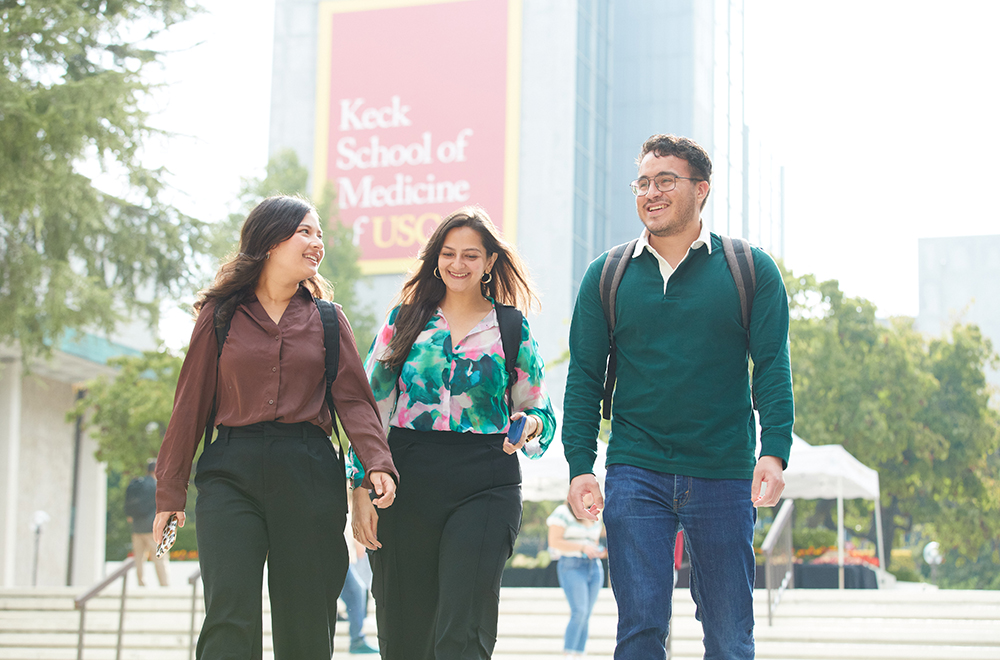
In honor of the 10th anniversary of USC’s stem cell master’s program, we asked 10 alumni to reflect on how the program changed the course of their lives and careers.
Launched in 2014 as the first master’s program in stem cell biology and regenerative medicine in the US, the program integrates courses in cutting-edge biomedical science with extensive hands-on laboratory experience.
“When we introduced USC’s stem cell master’s program, our goal was to prepare the next generation of leaders who would shape the future of stem cell biology and regenerative medicine in all of its dimensions,” said Professor Andy McMahon, director of the Eli and Edythe Broad Center for Regenerative Medicine and Stem Cell Research at USC. “We envisioned that our students would not only become researchers, educators, and health care providers, but also business professionals, lawyers, policy and regulatory specialists, science communicators, and leaders in all aspects of this rapidly growing field.”
Ten years later, the master’s program has graduated more than 300 alumni, who have excelled in these professions and more
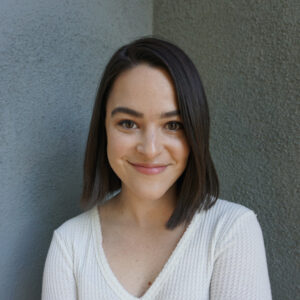
Clare Yarka, Class of 2016
Assistant Director for Corporate Partnerships, Caltech
“When I’m reflecting back on what I thought the purpose of the master’s program was going to be, it was allowing me to pursue an intellectual curiosity that I had as an undergrad. Obviously, I didn’t know what was going to come of that. But in retrospect, now it’s had a compounding positive effect on my career. I needed to attend the MS program in order to get my first job at Kite Pharma. That return on investment, so to speak, was very direct. The job at Kite in turn got me the next job in industry at Instil Bio. And then, funnily enough, both of those jobs in industry were required for my current role in academia, because it is an industry-facing role. It’s really about connecting labs on campus to biotech companies and pharma companies that want to sponsor research. So in that way, each step was compounding on the other, and it did really start with the master’s program.”
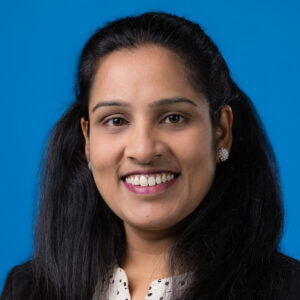
Rekha Prakash, Class of 2016
Biotechnology Educator and Pathway Lead for the Medical and Health Sciences Linked Learning Pathway, Teacher Advisor for CAL HOSA and MESA UCLA NEDC, Theodore Roosevelt High School
“I can reflect on how the USC master’s program impacted my teaching career. My initial plan was to do a PhD in neurobiology, but the USC master’s program really provided me with insight into having different perspectives within the stem cell field. It’s not just stem cell research. Seeing the teachers in USC’s master’s program was also an inspiration to be a biomedical educator. I began as a research associate at Cedars Sinai even before graduation, and then shortly after I graduated, within 3 or 4 months, I got a job offer from LAUSD (Los Angeles Unified School District). So that’s how I jumped straight into teaching, and it’s been a fascinating 9 years in LAUSD and 5 years at Roosevelt High School. Eventually, when I started teaching, a passion also emerged towards educational equity and leadership, so I earned my third master’s in educational leadership with an administrative credential from UCLA Center X Principal Leadership Institute (PLI) last June.”
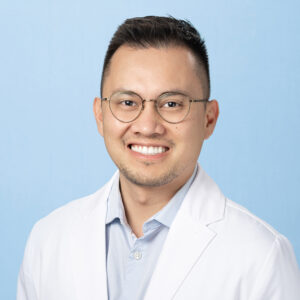
Nelson Poliran, Jr., Class of 2017
Dentist, Gentle Dental Placentia
“Through USC’s master’s program, I got to connect basic science research to clinical and ultimately to dentistry. Working with Dr. Yang Chai and his laboratory really pushed me to apply for not only the DDS program, but also the PhD program at UCLA. So you do the entire DDS first and then you do the entire PhD afterwards. I wanted to do academia in the beginning, but the more I worked with people, the more I liked clinical practice. I had also enhanced my skills so much in the clinical aspects that I didn’t want to lose that. So I left UCLA after completing my DDS, and moved to New Mexico to work with Aspen Dental. I wanted something where I would be the main provider, get to do all the complicated cases, and just really hone my skills. And so rural New Mexico was where it was at. I moved back to California in July 2023. Now I’m working in Placentia over here in North Orange County at another corporate office called Gentle Dental.”

Michael Woo, Class of 2017
cGMP Manufacturing Specialist, USC/CHLA Current Good Manufacturing Practice (cGMP) Laboratory
“I earned a Bachelor of Science in Bioengineering at the University of Washington, Seattle. However, the program was mostly focused on the engineering aspect of the field, and I was more interested in soft-tissue engineering. I initially wanted to join the Master of Science in SCRM at USC, because it was a program specifically focused on stem cell research, which I strongly believe is the future of cutting-edge medical research and therapies. The master’s program was not only eye-opening for me to see how diverse the research landscape is for this area, but also how translational it is. In the master’s program, I got to work with the late Dr. Neil Segil, and my experience in his lab really helped me to develop more of a researcher’s mindset. Furthermore, throughout the year-long program, external speakers were brought-in to talk about their work and how it relates to cellular therapies. These networking opportunities helped jumpstart my current career, and upon graduating in 2017, I applied and worked for City of Hope’s CAR-T cGMP manufacturing facility. In 2023, I made the transition back to USC to work in the USC/CHLA cGMP manufacturing facility here at the Keck School of Medicine.”

Mohamed El-Farra, Class of 2018
General Surgery Resident, Loma Linda University Health
“I thought it would be great to be able to get a master’s degree before I actually went off to medical school. I did the master’s program as a progressive degree student and worked in Dr. Neil Segil’s lab. The master’s degree was a great with exposure to research inside the lab and outside with classes focused on breaking down research papers, their methodologies, and working on writing in research. Socially, the program was great. I made plenty of friends that I still keep in touch with today! After the program, I went to medical school at UC Riverside School of Medicine, and I’m in residency right now at Loma Linda. Because of the program, I felt that I had a strong foundation any time we discussed biology, molecular biology, or pharmacology. I was comfortable looking at research papers and formulating my own opinions about them. Now, in my residency, I’m still reading these papers, and I’m interested in taking time off to do research. I think my experience with having gotten a master’s in stem cell biology really will allow me to feel comfortable jumping into any type of research and getting a head start in terms of my career of hopefully becoming a physician-researcher.”
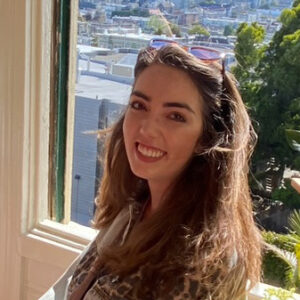
Olivia Laveroni, Class of 2021
Life Sciences Research Professional, Stanford University
“I always knew that I wanted to work in science in some capacity and specifically in research, but also I wanted to try it out first. Through the progressive master’s degree program, I was able to learn and experience many different aspects of research that ultimately confirmed that I wanted to pursue it as my future career. The program opened my eyes to the research world, and then affirmed and made me confident in the route that I was about to take in academic research. During the program, I was able to join Dr. Unmesh Jadhav’s lab where I am very grateful for the experience. After graduating, I started working at Stanford just a few weeks after leaving USC, and I’m still here working in a cancer research laboratory, where the research definitely makes me happy and is always interesting. I use all the knowledge I gained from my MS degree every single day from using a confocal microscope, sectioning tissue, to scientific writing. The knowledge and skills gained from this program are unlike any other that I know of and are extremely valuable. I’m very grateful for the master’s program and can’t speak highly enough about it.”
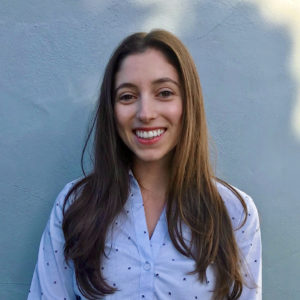
Tal Rosen, Class of 2021
PhD Student, Jian Xu Lab, USC
“I graduated from UC Santa Cruz with a bachelor’s in biochemistry and molecular biology, and was working as a medical scribe for a couple of years while trying to decide what my next steps were. I decided to apply to the PhD Programs in Biomedical and Biological Sciences (PIBBS) at USC. Although I was not accepted initially, I could transfer my application to the stem cell master’s program and saw this as an opportunity continue my education. I was sold by the interesting research in the department and of course the impressive website. Despite the virtual nature of the program that year due to the pandemic, I formed meaningful connections with my peers and experienced genuine support from the professors. SCRM not only provided me with a sense of belonging in a time that was so unpredictable, but also opened a substantial door to my future. The program gave me the opportunity to work in Dr. Min Yu’s lab, which excited me about pursuing my own research in a PhD. Now I’m in my PhD at USC’s Center for Craniofacial Molecular Biology in Dr. Jian Xu’s lab. I’m studying bone development. It’s been unusual journey to get where I am, but I honestly don’t think I would be here without the master’s program. I am grateful for the profound impact the program has had on my life.”
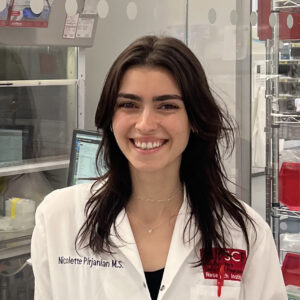
Nicolette Pirjanian, Class of 2022
Associate Scientist, New York Stem Cell Foundation Research Institute
“I was enrolled in a developmental biology class in my final quarter as an undergraduate at UC Santa Barbara, and there was one slide about stem cells that absolutely caught my eye—I found it disappointing that we didn’t delve deeper into it. After exploring the available literature on stem cells, I decided I want to go get some more research experience specifically in this field. The USC program seemed to be a perfect fit, and I was ecstatic to be accepted. The program did a really good job of laying our foundation in stem cell research. I ultimately joined the Quadrato Lab for more hands-on experience, and I was fortunate to sit in lab meetings and listen to the PhD students and the postdocs speak about their work. This opened my eyes to all possibilities for stem cell research. After the master’s program, I ended up coming to New York for a job at the New York Stem Cell Foundation Research Institute. I wouldn’t have had all of these connections and knowledge about where to go after, if I wasn’t part of the master’s program. I felt set up for success in finding my footing in the realm of stem cell research. My experiences in New York and at USC have motivated me to now apply for MD/PhD programs.”
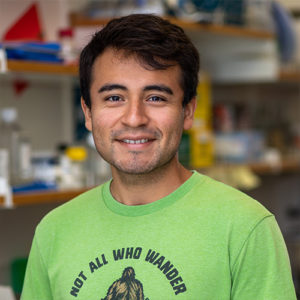
Manuel Santana, Class of 2022
Instructor, Natural Sciences, Pasadena City College (PCC)
“I took classes at PCC a decade ago, and I loved it. I had an instructor who was the best lecturer I have ever heard in my life. It was like being in a movie theater. It was so captivating. I wanted to be able to know a subject as well as he knew it, to be able to give those lectures in the way that he did. So before I came to USC, my goal was to teach. That was the big overall goal. So I did a one-year training certificate program for biotech and stem cell culturing at PCC, and a one-year internship at USC through PCC’s CIRM Bridges to Stem Cell Research and Therapy program. And then I worked in Justin Ichida’s lab at USC for a couple of years. And so applying to USC’s stem cell biology master’s degree program was the next step, and I knew that would help me then get a job at a community college. And so that was the progression. Obviously, all the things that I learned there are helping me now, because I do teach a cell culture class. So the connection is very clear and very direct.”
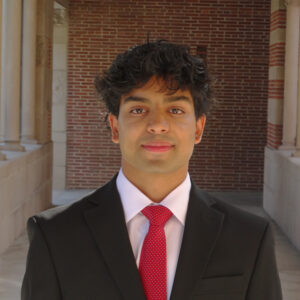
Gaveen Godage, Class of 2024
Fulbright Scholar, Germany
“I was undergrad human biology major here at USC. I originally started by joining Dr. Morsut’s lab sophomore year in the spring. And that was my introduction to the entire department—coming in person, visiting the lab, being a part of the research. And that pushed me more into wanting to know more about the field, and then I applied for the progressive master’s degree program. Master’s program director Dr. Mariani was super flexible with all the course planning. She allowed me to push myself and gave me the opportunity to take on a thesis, showing support and belief in me. And then the second thing I really enjoy about the program is the exposure to so many different fields and experts. In terms of transitioning to this next step, I wanted to apply for the Fulbright Grant within stem cell research. There’s a lab in the Technical University of Munich led by Dr. Alessandra Moretti, who I’m going to be working with. And they work with patient-derived pluripotent stem cells to model different cardiovascular diseases—adult diseases, but also congenital diseases. And so that project is a really big pull for me, and it also has a lot of ties to the research that I was doing in the Morsut Lab, so it’s a good transfer of skills. After my Fulbright year, I’m going to be applying to medical school.”
